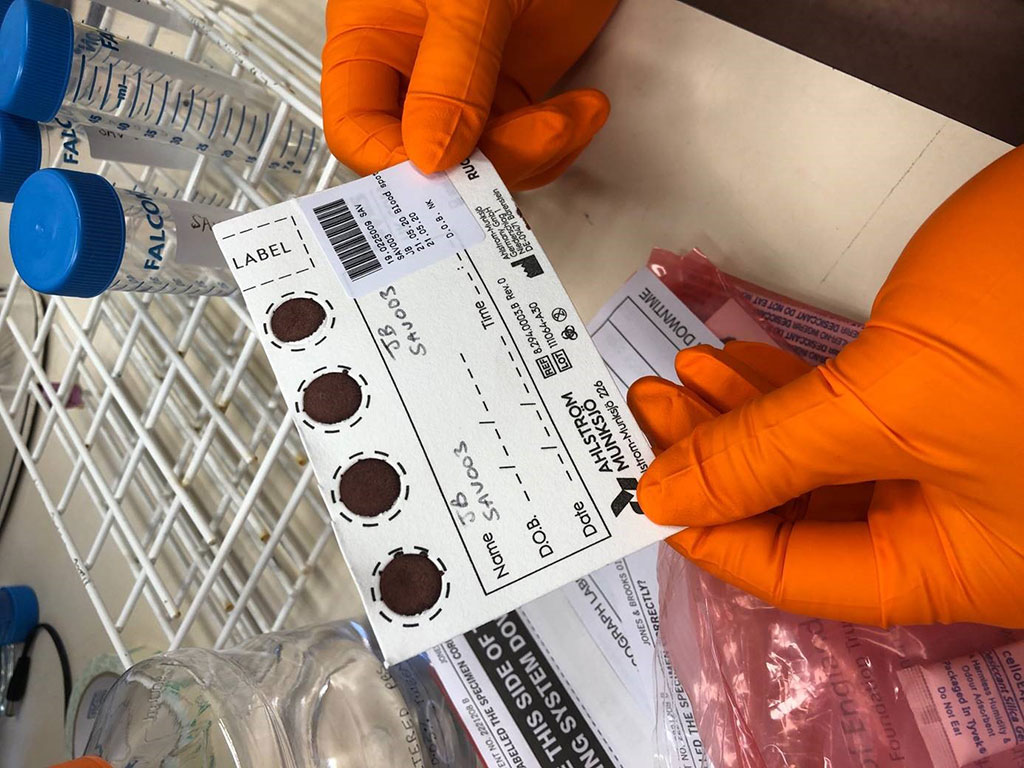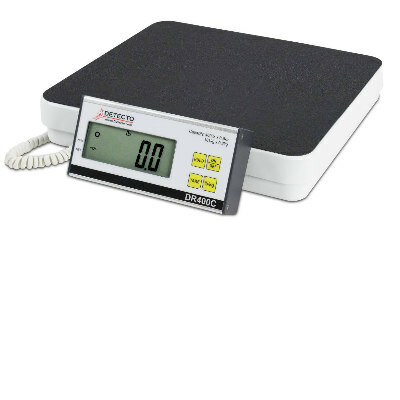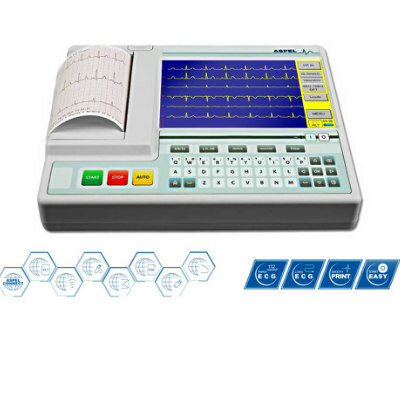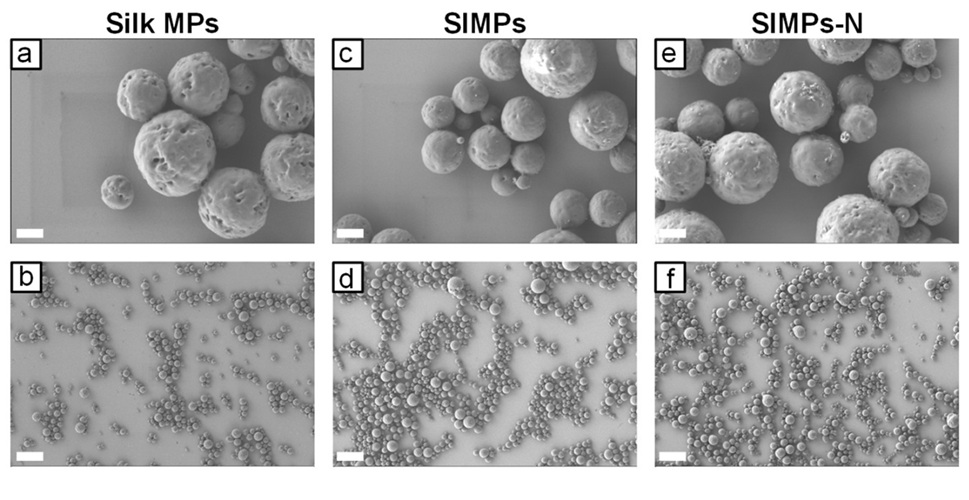Dried Blood Spot Sampling Offers Inexpensive Way to Widen Access to COVID-19 Antibody Testing
|
By HospiMedica International staff writers Posted on 28 Sep 2020 |

Image: DBS sampling is simple, inexpensive and can be self-collected by the patient at home, using a simple finger prick (Photo courtesy of University of Birmingham)
Using dried blood spot samples (DBS) is an accurate alternative to venous blood in detecting SARS-CoV-2 antibody tests, according to a new study by immunology experts at the University of Birmingham (Birmingham, UK).
Currently antibody testing for COVID-19 uses serum or plasma, which requires a full intravenous blood sample, collected by a trained phlebotomist. For population-wide or high volume testing, the use of such sampling is limited by logistic challenges, resources, and costs, as well as the risk of SARS-CoV-2 exposure from direct patient contact. In contrast, DBS sampling is simple, inexpensive and can be self-collected by the patient at home, using a simple finger prick. The sample can then be collected on a forensic grade card before being posted back to labs for processing. This offers exciting possibilities to widen access to antibody testing particularly in more resource limited countries.
Researchers analyzed serum and DBS samples from volunteers at University Hospitals Birmingham Foundation NHS Trust, some of whom had previously tested positive for SARS-CoV-2 by molecular tests, while the status of other volunteers was either negative or unknown. The anonymized matched serum and DBS samples were then processed using a highly sensitive ELISA test, developed by the University’s Clinical Immunology Service in partnership with The Binding Site (Birmingham, UK), which specifically detects antibodies (IgG, IgA and IgM) to the SARS-CoV-2 trimeric spike protein.
Results showed a significant correlation between matched DBS and serum samples and minimal differences in results observed by sample type, with negligible discordance. Relative to serum samples, DBS samples achieved 98% sensitivity and 100% specificity for detecting anti-SARS-CoV-2 S glycoprotein antibodies. 100% of the PCR-positive samples were also antibody-positive in DBS.
“Our results have demonstrated that dry blood spot sampling not only offers a viable alternative for antibodies testing, but one that overcomes the limitations that current methods can present by eliminating the need for skilled phlebotomists,” said senior author Dr Matthew O’Shea from the University’s Institute of Immunology and Immunotherapy. “DBS offers the opportunity for wider population-level testing and improved surveillance in vulnerable groups such as patients with chronic conditions, the immunocompromised and the elderly by removing the need to come into contact with a healthcare professional during sample collection.”
“As well as offering the opportunity for improved population-wide antibody testing in the UK, the simplicity and cost-effectiveness of the dry blood spot method could improve the effectiveness of sampling in low and middle-income countries, among groups where venepuncture is culturally unacceptable or in geographically dispersed populations,” added co-author Professor Adam Cunningham from the Institute of Immunology and Immunotherapy.
Related Links:
University of Birmingham
The Binding Site
Currently antibody testing for COVID-19 uses serum or plasma, which requires a full intravenous blood sample, collected by a trained phlebotomist. For population-wide or high volume testing, the use of such sampling is limited by logistic challenges, resources, and costs, as well as the risk of SARS-CoV-2 exposure from direct patient contact. In contrast, DBS sampling is simple, inexpensive and can be self-collected by the patient at home, using a simple finger prick. The sample can then be collected on a forensic grade card before being posted back to labs for processing. This offers exciting possibilities to widen access to antibody testing particularly in more resource limited countries.
Researchers analyzed serum and DBS samples from volunteers at University Hospitals Birmingham Foundation NHS Trust, some of whom had previously tested positive for SARS-CoV-2 by molecular tests, while the status of other volunteers was either negative or unknown. The anonymized matched serum and DBS samples were then processed using a highly sensitive ELISA test, developed by the University’s Clinical Immunology Service in partnership with The Binding Site (Birmingham, UK), which specifically detects antibodies (IgG, IgA and IgM) to the SARS-CoV-2 trimeric spike protein.
Results showed a significant correlation between matched DBS and serum samples and minimal differences in results observed by sample type, with negligible discordance. Relative to serum samples, DBS samples achieved 98% sensitivity and 100% specificity for detecting anti-SARS-CoV-2 S glycoprotein antibodies. 100% of the PCR-positive samples were also antibody-positive in DBS.
“Our results have demonstrated that dry blood spot sampling not only offers a viable alternative for antibodies testing, but one that overcomes the limitations that current methods can present by eliminating the need for skilled phlebotomists,” said senior author Dr Matthew O’Shea from the University’s Institute of Immunology and Immunotherapy. “DBS offers the opportunity for wider population-level testing and improved surveillance in vulnerable groups such as patients with chronic conditions, the immunocompromised and the elderly by removing the need to come into contact with a healthcare professional during sample collection.”
“As well as offering the opportunity for improved population-wide antibody testing in the UK, the simplicity and cost-effectiveness of the dry blood spot method could improve the effectiveness of sampling in low and middle-income countries, among groups where venepuncture is culturally unacceptable or in geographically dispersed populations,” added co-author Professor Adam Cunningham from the Institute of Immunology and Immunotherapy.
Related Links:
University of Birmingham
The Binding Site
Latest COVID-19 News
- Low-Cost System Detects SARS-CoV-2 Virus in Hospital Air Using High-Tech Bubbles
- World's First Inhalable COVID-19 Vaccine Approved in China
- COVID-19 Vaccine Patch Fights SARS-CoV-2 Variants Better than Needles
- Blood Viscosity Testing Can Predict Risk of Death in Hospitalized COVID-19 Patients
- ‘Covid Computer’ Uses AI to Detect COVID-19 from Chest CT Scans
- MRI Lung-Imaging Technique Shows Cause of Long-COVID Symptoms
- Chest CT Scans of COVID-19 Patients Could Help Distinguish Between SARS-CoV-2 Variants
- Specialized MRI Detects Lung Abnormalities in Non-Hospitalized Long COVID Patients
- AI Algorithm Identifies Hospitalized Patients at Highest Risk of Dying From COVID-19
- Sweat Sensor Detects Key Biomarkers That Provide Early Warning of COVID-19 and Flu
- Study Assesses Impact of COVID-19 on Ventilation/Perfusion Scintigraphy
- CT Imaging Study Finds Vaccination Reduces Risk of COVID-19 Associated Pulmonary Embolism
- Third Day in Hospital a ‘Tipping Point’ in Severity of COVID-19 Pneumonia
- Longer Interval Between COVID-19 Vaccines Generates Up to Nine Times as Many Antibodies
- AI Model for Monitoring COVID-19 Predicts Mortality Within First 30 Days of Admission
- AI Predicts COVID Prognosis at Near-Expert Level Based Off CT Scans
Channels
Critical Care
view channel
AI Interpretability Tool for Photographed ECG Images Offers Pixel-Level Precision
The electrocardiogram (ECG) is a crucial diagnostic tool in modern medicine, used to detect heart conditions such as arrhythmias and structural abnormalities. Every year, millions of ECGs are performed... Read more
AI-ECG Tools Can Identify Heart Muscle Weakness in Women Before Pregnancy
Each year, some mothers die from heart-related issues after childbirth, with many of these deaths being preventable. Screening for heart weakness before pregnancy could be crucial in identifying women... Read moreSurgical Techniques
view channel
Early TAVR Intervention Reduces Cardiovascular Events in Asymptomatic Aortic Stenosis Patients
Each year, approximately 300,000 Americans are diagnosed with aortic stenosis (AS), a serious condition that results from the narrowing or blockage of the aortic valve in the heart. Two common treatments... Read more
New Procedure Found Safe and Effective for Patients Undergoing Transcatheter Mitral Valve Replacement
In the United States, approximately four million people suffer from mitral valve regurgitation, the most common type of heart valve disease. As an alternative to open-heart surgery, transcatheter mitral... Read more
No-Touch Vein Harvesting Reduces Graft Failure Risk for Heart Bypass Patients
A coronary artery bypass graft (CABG) is a surgical procedure used to enhance blood flow and oxygen supply to the heart in individuals with coronary heart disease. During the procedure, a healthy blood... Read more
DNA Origami Improves Imaging of Dense Pancreatic Tissue for Cancer Detection and Treatment
One of the challenges of fighting pancreatic cancer is finding ways to penetrate the organ’s dense tissue to define the margins between malignant and normal tissue. Now, a new study uses DNA origami structures... Read morePatient Care
view channel
Portable Biosensor Platform to Reduce Hospital-Acquired Infections
Approximately 4 million patients in the European Union acquire healthcare-associated infections (HAIs) or nosocomial infections each year, with around 37,000 deaths directly resulting from these infections,... Read moreFirst-Of-Its-Kind Portable Germicidal Light Technology Disinfects High-Touch Clinical Surfaces in Seconds
Reducing healthcare-acquired infections (HAIs) remains a pressing issue within global healthcare systems. In the United States alone, 1.7 million patients contract HAIs annually, leading to approximately... Read more
Surgical Capacity Optimization Solution Helps Hospitals Boost OR Utilization
An innovative solution has the capability to transform surgical capacity utilization by targeting the root cause of surgical block time inefficiencies. Fujitsu Limited’s (Tokyo, Japan) Surgical Capacity... Read more
Game-Changing Innovation in Surgical Instrument Sterilization Significantly Improves OR Throughput
A groundbreaking innovation enables hospitals to significantly improve instrument processing time and throughput in operating rooms (ORs) and sterile processing departments. Turbett Surgical, Inc.... Read moreHealth IT
view channel
Printable Molecule-Selective Nanoparticles Enable Mass Production of Wearable Biosensors
The future of medicine is likely to focus on the personalization of healthcare—understanding exactly what an individual requires and delivering the appropriate combination of nutrients, metabolites, and... Read more
Smartwatches Could Detect Congestive Heart Failure
Diagnosing congestive heart failure (CHF) typically requires expensive and time-consuming imaging techniques like echocardiography, also known as cardiac ultrasound. Previously, detecting CHF by analyzing... Read moreBusiness
view channel
Expanded Collaboration to Transform OR Technology Through AI and Automation
The expansion of an existing collaboration between three leading companies aims to develop artificial intelligence (AI)-driven solutions for smart operating rooms with sophisticated monitoring and automation.... Read more


















